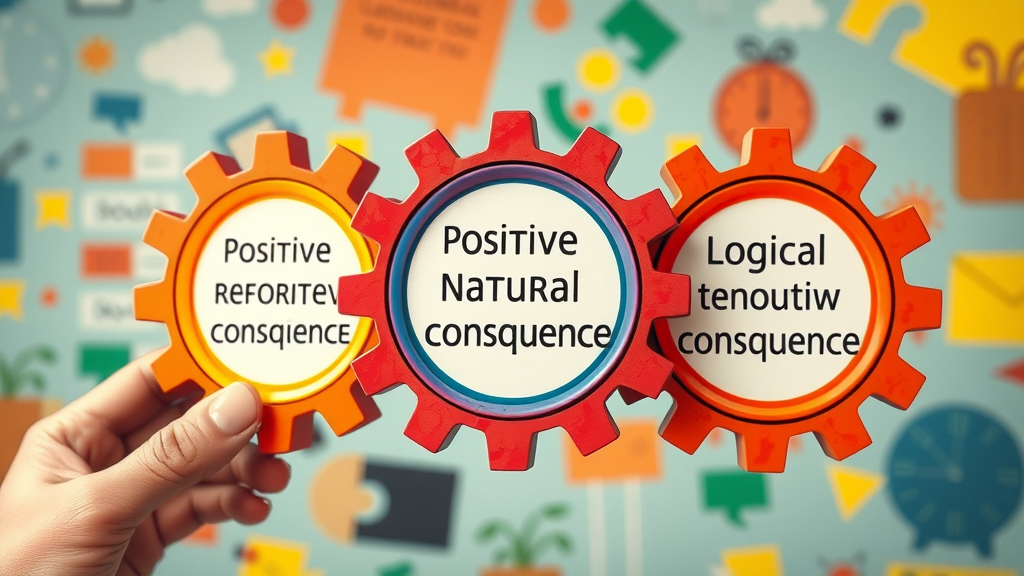Hook: Are the discipline techniques you use with your teen building trust and responsibility—or are they driving a wedge in your relationship? Discover methods that empower, not punish, and unlock the keys to positive teen discipline in the modern family.
Opening Inquiry: Are Your Discipline Techniques for Teens Actually Helping or Hurting?
Every parent wants what’s best for their teen—but what if the very discipline strategies you use are causing more harm than good? The teenage years bring unique challenges and require a shift away from traditional punishments toward techniques that foster understanding, responsibility, and self-discipline. This guide dives deep into discipline techniques for teens, answering your toughest questions and revealing what truly leads to positive growth. Are you using discipline strategies that connect, or those that create power struggles? Let’s explore the best approaches for supporting your teen’s development and mental health—ensuring your discipline helps, not hurts.

Why Traditional Discipline Strategies for Teens May Not Work
Many parents instinctively rely on techniques they experienced as children—timeouts, grounding, or immediate removal of privileges. While some of these might be effective with younger kids, applying them to teens can backfire. Adolescents crave independence and respect. Methods that seem controlling or punitive can intensify power struggles, damaging the relationship with your teen and sometimes encouraging more negative behavior. As teenagers become young adults, their need to feel heard, trusted, and understood increases. Relying solely on traditional discipline can result in teens shutting down communication, rebelling, or developing anxiety about making mistakes. True growth happens when discipline techniques for teens are rooted in guidance rather than punishment, aligning consequences to behaviors and helping teens learn from real-life outcomes.
Understanding the Unique Challenges of Teen Discipline
Teen discipline isn’t just about correcting behavior—it’s about preparing young adults for independence. The changes of adolescence, including emotional swings, social pressures, and identity formation, add complexity to setting rules and boundaries. Parents face challenges such as a teen’s desire for autonomy, increased arguments, and the ever-present risk of power struggles. Discipline techniques for teens must be flexible and adapt to the teen’s maturity while remaining firm on important house rules and boundaries. By shifting from an adversarial stance to a problem-solving partnership, you send the message that discipline is about building trust, teaching life skills, and supporting mental health. This sets the stage for both accountability and connection, ensuring your teen learns to make good choices as they grow.
What You'll Learn: Key Insights on Effective Discipline Techniques for Teens
The importance of positive discipline strategies for teens
Differences between natural and logical consequences
How to set clear rules and house rules
Promoting good behavior and supporting mental health
Actionable steps for parents and caregivers

Understanding Discipline Techniques for Teens
What is Discipline for Teenagers?
Discipline for teenagers means guiding them to understand the consequences of their actions while nurturing their growing independence. Unlike punitive measures focused on immediate compliance, effective teen discipline teaches accountability, problem-solving, and self-regulation. Setting clear rules helps teens know what’s expected, but discipline strategies also encourage self-reflection and conversation about choices. This process transforms discipline from a source of fear or resentment into a supportive frame that prepares young adults for life outside the family home. Ultimately, discipline techniques for teens should develop their ability to manage freedom and responsibility, contributing to their long-term growth and well-being.
Common Misconceptions about Teen Discipline
Many parents believe discipline equates to punishment. However, true discipline goes beyond simply halting negative behavior; it’s about teaching, relationship-building, and preventing future issues. A frequent misconception is that “cracking down harder” will motivate change. In reality, imposing harsher punishments often fuels rebellion and damages trust. Another myth suggests that teens naturally know right from wrong—when in fact, they need consistent guidance to learn self-discipline. Effective discipline strategies employ natural and logical consequences that are directly related to a teen’s choices, fostering understanding rather than resentment. Recognizing the difference between punitive and corrective approaches is essential for parents and caregivers seeking lasting positive behavior from their teens.
Why Teens Respond Differently to Discipline Strategies
Teens are not just “big kids”—they are rapidly changing young adults with their own opinions and emotional needs. Their brains are still developing, especially the areas linked to impulse control and reasoning. This means discipline techniques for teens must recognize that what works for a younger child may not apply to a teenager struggling with independence. Teens often push back against strict authority to assert their own identity, making it vital for parents to stay consistent while also being willing to listen and adapt. Approaching discipline with open communication helps teens feel respected, which increases the likelihood they will listen and learn, rather than resist or withdraw into silence. Understanding these developmental needs is key to crafting effective discipline strategies that help teens make good decisions.
The Importance of Discipline Techniques for Teens
Impact of Discipline on Teen Mental Health
Mental health in teenagers is intricately linked to the environment at home and the approach to discipline. Positive discipline techniques—those grounded in empathy, consistent boundaries, and mutual respect—can build resilience, reduce anxiety, and help teens cope with stress. On the other hand, inconsistent or overly harsh discipline may increase the risk for depression, low self-esteem, and other mental health problems. When parents use discipline techniques for teens that prioritize understanding and healthy boundaries, they create a safe space for emotional expression and learning. Open communication, trust, and a sense of security in the parent-teen relationship all support better mental health outcomes, making discipline a foundation for lifelong emotional well-being.

Building Self-Discipline and Responsibility in Teens
Self-discipline is an essential skill for young adults, and it’s cultivated through well-chosen discipline techniques. When teens are encouraged to take responsibility for their actions and experience the natural consequences of their choices, they learn to “make good” on mistakes and earn back trust. House rules give clear expectations while allowing teens to practice autonomy within safe boundaries. This balance helps them internalize positive behaviors and develop decision-making skills. Effective discipline strategies avoid micromanagement, instead guiding teens to recognize how their actions impact themselves and others—a vital lesson for success beyond the teenage years. Through supportive guidance and logical consequences, teens learn to regulate themselves, reducing reliance on external controls and preparing them for adulthood.
The Role of Positive Reinforcement and Consistent Boundaries
Positive reinforcement is one of the most successful discipline techniques for teens. Acknowledging good behavior with praise, privileges, or extra responsibilities encourages teens to repeat those actions. At the same time, maintaining consistent boundaries—clear rules that apply every day—teaches accountability and reliability. Teens respond well to structure, especially when they understand the reasons behind the rules and see logical connections between their choices and the outcomes. Combining this with consistent, fair, and respectful discipline makes it possible to guide teenager behavior effectively without resorting to constant power struggles or punishments. Encouragement, open communication, and clarity are the pillars of a discipline strategy that supports growth and strong family relationships.
Effective Discipline Strategies for Teens: Evidence-Based Approaches
Comparison of Discipline Techniques for Teens |
||
Technique |
Description |
Best Use |
|---|---|---|
Natural Consequence |
Allowing teens to experience the direct result of their actions (e.g., forgetting homework leads to a lower grade). |
Encourages self-responsibility and learning from real-life situations. |
Logical Consequence |
Imposing a consequence that is logically connected to the misbehavior (e.g., losing driving privileges after missing curfew). |
Reinforces cause-and-effect and promotes accountability. |
Positive Reinforcement |
Recognizing and rewarding positive behavior to encourage its repetition. |
Builds self-esteem and strengthens desired behaviors. |

Natural Consequence: Allowing Teens to Learn from Real Outcomes
Natural consequences occur when teens experience the actual result of their actions—without parental interference. For instance, if a teen neglects to complete a school assignment, they face a lower grade. This approach can be powerful because it mirrors how the real world operates, giving teens authentic feedback and the opportunity to make good on mistakes. Natural consequences help young adults develop critical thinking by teaching them to connect their choices with outcomes, reducing the need for repeated reminders or punishments from parents. However, the challenge for caregivers is to step back and allow teens to face these results, intervening only when safety is at risk. Over time, this technique encourages responsibility and prepares teens for independent decision-making.
Logical Consequence: Linking Outcomes to Behavior
Logical consequences are directly related to a teen’s behavior and imposed by caregivers to connect actions with outcomes. For example, if a teen misses their curfew, the logical consequence might be losing the privilege of going out with friends for a while. This strategy is most effective when communicated in advance and applied consistently. It differs from arbitrary punishments because the consequence is directly related to the misbehavior, helping teens understand the “why” behind the rule. Logical consequences also offer teens a pathway to earn back trust or privileges, which can motivate positive change. Using logical consequences as a discipline strategy reduces resentment, eliminates the temptation for power struggles, and helps your teen internalize responsible habits.
How to Discipline a Teenager with Compassion and Respect
When you discipline your teen, the approach matters as much as the consequence. Compassionate discipline recognizes the teen’s perspective, allows space for explanation, and avoids shaming. Rather than viewing discipline as something you do “to” your teenager, frame it as a process you navigate together. Start with open communication—invite your teen to discuss what happened, how they feel, and what they think a fair outcome should be. This collaborative style fosters mutual respect, strengthens your relationship, and models conflict resolution. Discipline becomes less about asserting authority and more about teaching valuable life lessons, helping your teen develop empathy, accountability, and self-discipline.
Clear Rules and House Rules: The Foundation of Teen Discipline
Having clear rules—or house rules—is crucial for effective teen discipline. When expectations are spelled out, teens know exactly what’s required and what the consequences of breaking the rules will be. House rules may cover areas like curfew, device usage, chores, and family responsibilities. The key is to establish these guidelines collaboratively whenever possible, giving your teen a voice in the process. This buy-in makes it more likely that they’ll respect and follow the rules. Consistently reviewing and revising house rules as your teen matures shows flexibility and respect for their growing independence, while ensuring key boundaries remain clear and enforceable. Ultimately, clear rules lay the foundation for trust and minimize opportunities for conflict and misunderstanding within families.
Discipline Strategies: Balancing Consistency and Flexibility
Consistency is a cornerstone of any successful discipline strategy—but so is flexibility. Teens need to know that rules and consequences apply every day, creating a sense of security and fairness. At the same time, unforeseen circumstances or exceptional behavior may call for adjustments. For example, if a teen has consistently followed curfew for months but is late one night due to a genuine emergency, being open to discussion and compromise can build trust. The best discipline techniques for teens allow parents to stay consistent with house rules while also listening to their teen’s viewpoint. This approach reduces the risk of ongoing power struggles and demonstrates that discipline is rooted in care, communication, and adaptability.
Setting Clear Rules to Support Good Behavior and Mental Health

Establishing House Rules Together with Your Teen
Creating house rules is most effective when it’s a collaborative process between parents and teens. Involving your teen in setting boundaries demonstrates respect for their voice, strengthening your relationship and encouraging accountability. Start by identifying the non-negotiables for safety and well-being—like rules about driving, substance use, and responsibilities at home. Discuss why these rules matter, and invite your teen to suggest guidelines that feel fair and realistic. The process should include input from all family members, and the final list of rules should be clear and easy to understand. Post the rules where everyone can see them, and agree on consequences should rules be broken. This transparency reduces conflict and helps teens learn the importance of structure in maintaining mental health and positive family dynamics.
Promoting Good Behavior with Positive Role Modeling
Parents and caregivers are the most influential role models in a teen’s life. Teens are more likely to mirror positive behaviors they see at home—like open communication, problem-solving, and respect for boundaries. Be consistent in your actions; if your teen observes you managing stress in healthy ways and following house rules yourself, they’ll understand that rules apply to everyone. Praise and positive reinforcement are essential, too—recognize when your teen makes good choices or goes above and beyond expectations. Over time, your example teaches more than any lecture, laying the groundwork for your teen’s own integrity and sense of responsibility as they mature.
Addressing Rule Breaking with Thoughtful Discipline Techniques for Teens
No discipline strategy guarantees perfect compliance; teens will push limits as part of their growth. When rules are broken, respond thoughtfully and consistently. Address the situation calmly—avoid yelling or giving in to frustration, which can escalate conflict and undermine your message. Focus on the specific behavior, not the teen’s character, and enforce the agreed-upon consequence. Use these moments as teaching opportunities: help your teen reflect on the impact of their actions, consider how to make good on the mistake, and talk about how to make better choices next time. Restoring trust may require time or effort, but a respectful, fair response will encourage teens to own their behavior and rebuild trust with family members.
Discipline Techniques for Teens Who Won't Listen
Understanding the Root Causes of Defiance
It’s common for some teens to resist rules or ignore discipline strategies, but defiance often signals deeper issues. Some teens act out due to changes in their mental health, social pressures, or struggles with autonomy. Others may feel misunderstood or believe rules are unfair. As a parent or caregiver, the first step is to understand the reasons behind the behavior. Listen for clues in your teen's tone, attitude, or stories about school and friendships. Defiance may be a signal for help—perhaps your teen feels overwhelmed, pressured, or disconnected. By seeking to understand the root cause rather than immediately imposing discipline, you demonstrate empathy and create a safe environment for honest dialogue, laying the foundation for meaningful change.
Communication Strategies: Listening First, Speaking Second
Effective discipline for teens who won’t listen starts with open communication. When emotions run high, the best approach is to listen first—allow your teen to express their feelings and point of view, even if you don’t agree. Resist the urge to interrupt or correct, which can deepen a power struggle. Once your teen feels heard, you’re more likely to have a calm discussion about rules and consequences. Use “I” statements to express your concerns and clarify expectations, and ask your teen for their ideas on resolving the situation. Communication builds trust, bridges the gap between parents and teens, and empowers teens to participate in finding solutions, turning conflict into cooperation.
Consistent Consequences and Restoring Trust
If your teen continues to ignore rules, maintaining consistency is essential. Apply agreed-upon consequences every time the rule is broken, but ensure they’re directly related to the behavior. For example, if a teen abuses their phone privileges, restrict access until trust is rebuilt. Allowing a way to earn back privileges motivates responsible behavior—teens need to see that trust, once broken, can be restored through positive action. Avoid public shaming or harsh punishments, focusing instead on the long-term goal of helping your teen grow into a responsible young adult. Clear rules, fair enforcement, and the opportunity to make amends are crucial in reestablishing trust and promoting lasting change.

Supporting Troubled Teenagers: Discipline as Guidance, Not Punishment
Identifying Teen Mental Health Needs
Some teens struggle with serious mental health challenges—such as anxiety, depression, or trauma—that can impact behavior at home and school. In these cases, discipline strategies must prioritize understanding and support. Changes in sleeping or eating patterns, withdrawal from friends, or dramatic shifts in mood may be warning signs. Instead of seeing all negative behavior as defiance, ask open-ended questions and express concern without judgment. Recognize when discipline alone isn’t enough and consider seeking guidance from mental health professionals. Creating a safe and supportive home environment encourages teens to share their feelings and seek help when needed, making discipline a form of guidance rather than punishment.

Connecting with School and Community Resources
When a teen faces serious emotional or behavioral challenges, parents cannot go it alone. Schools often have counselors, psychologists, and special programs to support student mental health and well-being. Don’t hesitate to reach out for input and involve these professionals in crafting a discipline plan that meets your teen’s needs. Many communities also offer support groups, mentoring programs, and youth services that provide additional guidance and structure. Collaborating with trusted adults outside the immediate family can give teens access to mentors and resources that reinforce positive behavior, build confidence, and offer a safety net during difficult times.
Collaboration Between Parents and Professionals
Supporting a troubled teen requires teamwork between parents, teachers, counselors, and sometimes health professionals. Share observations, communicate openly about discipline strategies, and create a unified plan to address concerns. Regular check-ins ensure everyone is on the same page and provide opportunities to celebrate progress or problem-solve new challenges. Above all, keep your teen involved in the process as much as possible—it’s their journey, and their voice is vital. A collaborative approach shows your teen that discipline isn’t about control, but about helping them succeed and overcome challenges, while safeguarding their mental health.
Quotes from Experts on Discipline Techniques for Teens
"Discipline for teens isn’t about punishment – it’s about teaching responsibility and resilience." – Dr. Laura Peters, Child Psychologist
“When you connect consequences to choices, teens learn to understand the power of their actions.” – Dr. Michael Travers, Adolescent Behavior Specialist
"The most effective discipline strategies combine consistency with compassion and communication." – Karen Miller, Licensed Family Therapist
People Also Ask About Discipline Techniques for Teens
What are the 5 C's of discipline?
Exploring the Five Pillars for Effective Teen Discipline
The 5 C's of discipline are: Clarity, Consistency, Communication, Consequences, and Compassion. Clarity ensures that rules and expectations are easy to understand. Consistency means applying rules and consequences fairly every time. Communication is about openly discussing expectations and listening to your teen’s perspective. Consequences—preferably natural or logical—teach young adults about responsibility. Compassion ensures that discipline is rooted in care and respect, supporting your teen’s mental health and self-esteem. Incorporating these principles helps families build a strong and cooperative foundation for effective teen discipline.
How to discipline a teenager who won't listen?
Strategies for Managing Challenging Behavior in Teens
Start by understanding the reasons behind your teen’s defiance. Are they feeling misunderstood, stressed, or overwhelmed? Open communication—a willingness to truly listen and let your teen speak—can reduce power struggles and help uncover root causes. Set clear house rules and apply logical consequences consistently, but always with empathy. Give your teen opportunities to earn back trust and privileges, and involve them in solving problems where possible. This approach promotes responsibility and helps your teen learn from the consequences of their actions, rather than just feeling punished or misunderstood.

How to discipline a teenager effectively?
Implementing Proven Discipline Strategies for Teens
Discipline your teen effectively by setting clear rules, explaining the “why” behind them, and following through on logical consequences. Use positive reinforcement to highlight and encourage good behavior, and hold regular family meetings to discuss rules and expectations. Avoid harsh punishments, which can harm your relationship and mental health. Instead, focus on building trust, respectful dialogue, and consistent boundaries. With this foundation, your teen will learn accountability and develop lifelong self-discipline.
What to do with a troubled teenager?
Professional Guidance and Home Discipline Techniques for Troubled Teens
If your teen is struggling with serious behavioral or emotional challenges, reach out to school counselors, therapists, or community resources for support. Maintain open communication, set clear expectations, and use discipline as a guide—not a punishment. Collaborating with professionals can help you create a tailored plan that addresses both behavior and mental health needs, ensuring your teen feels supported and understood. In the home, focus on reinforcing positive behaviors, providing structure, and celebrating progress—even small steps can lead to significant growth over time.
A demonstration video showing real-world discipline scenarios between parents and teens, featuring effective communication, respectful discussion, and logical consequences. Includes expert commentary and subtitles for accessibility.
Experts discuss the impact of discipline techniques for teens on mental health and share practical strategies for parents and caregivers.
List of Do's and Don'ts for Effective Teen Discipline
Do: Set clear rules and communicate them with your teen
Do: Use natural and logical consequences related to behavior
Do: Encourage open communication and listen to your teen’s perspective
Do: Stay consistent with discipline strategies
Do: Use positive reinforcement to promote good behavior
Don't: Resort to harsh punishment or public shaming
Don't: Ignore your teen’s feelings or mental health needs
Don't: Engage in power struggles over every issue
Don't: Apply consequences that are unrelated to the negative behavior
Don't: Dismiss your teen’s opinions or experiences
Frequently Asked Questions (FAQs) on Discipline Techniques for Teens
Q: What discipline strategy works best for teens?
A: The most effective strategies for teen discipline combine clear rules, open communication, natural and logical consequences, and positive reinforcement. Collaboration, respect, and consistency are key.
Q: How can I set house rules that my teen will follow?
A: Involve your teen in the rule-setting process. Explain the reasons behind each rule and agree on fair, logical consequences in advance. This shared approach leads to better cooperation.
Q: What should I do if my teen repeatedly breaks the rules?
A: Stay calm and consistent. Apply agreed-upon consequences, provide opportunities to earn back trust, and discuss ways to improve next time. If the behavior persists, consider seeking professional guidance for additional support.
Q: Can discipline strategies affect my teen’s mental health?
A: Yes. Discipline techniques that prioritize empathy, clear boundaries, and communication support healthy self-esteem and resilience, while harsh or inconsistent discipline may lead to anxiety or low self-worth.
Key Takeaways: Discipline Techniques for Teens that Actually Succeed
Effective discipline is rooted in respect, communication, and clear expectations.
Natural and logical consequences help teens learn accountability and life skills.
Positive reinforcement, consistent boundaries, and role modeling encourage good behavior and mental health.
Collaboration with your teen and seeking professional support when needed leads to better outcomes.
Conclusion: Empowering Parents and Teens for Long-Term Success
Choosing discipline techniques for teens that are positive, collaborative, and compassionate builds responsibility and trust—empowering both parents and teens for lifelong success.
 Add Row
Add Row  Add
Add 





Write A Comment